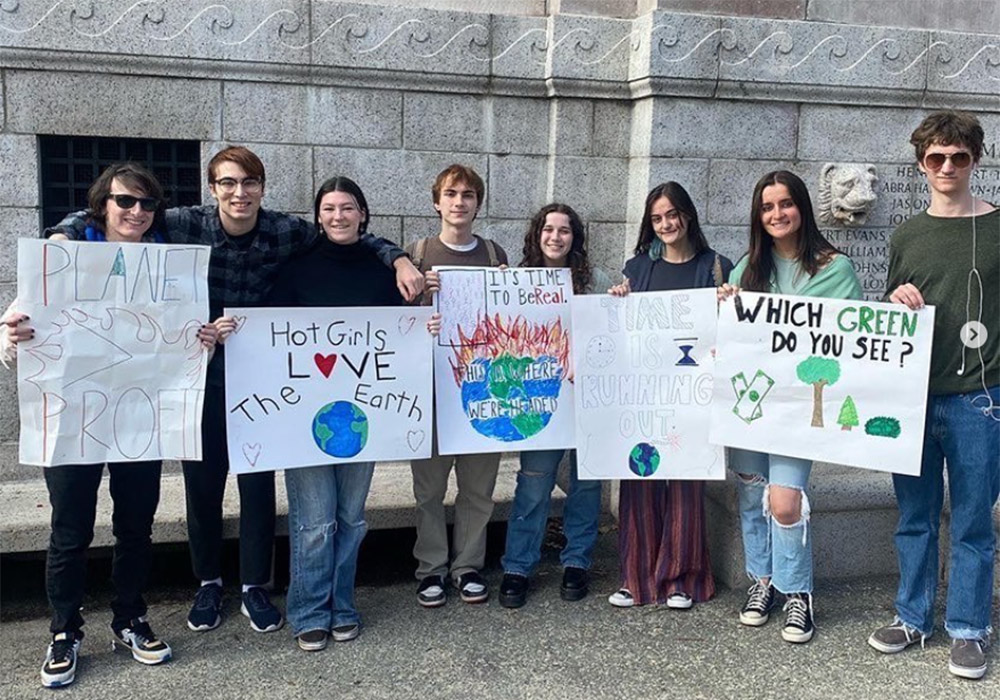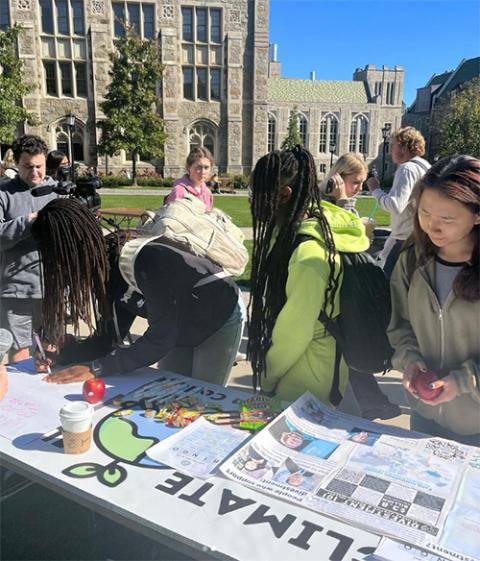
Photo from a #PeopleNotProfit protest, posted to the Climate Justice at Boston College Instagram account on March 26, 2022 (Courtesy of CJBC via @bcclimatejustice Instagram account)
Climate Justice at Boston College has been advocating for the Catholic Jesuit college to divest its endowment from fossil fuels for more than a decade. Members of the registered student organization said their efforts have often been met with resistance from the school's administration. But in recent years, they have faced an "acceleration" in instances when the college has discouraged their work or censored their use of the word "divestment."
The college's independent student newspaper The Heights reported April 25 that student Maureen Kelly's Instagram takeover of the Boston College account at an Earth Day fair initially featured a video of the club explaining its mission, which includes advocacy for the school to divest. But the video was promptly deleted.
Reportedly thinking the video's disappearance was due to an Instagram glitch, Kelly posted another video of the club, which was also removed. She told The Heights it was then she was informed by a student on the Boston College media team not to post about divestment.
Jack Dunn, Boston College associate vice president for university communications, declined to comment on specific incidents related to Climate Justice at Boston College. An emailed statement to EarthBeat said the college is "opposed to divestment from energy companies on the grounds that it is not an effective means of addressing climate change."
Stephanie Robinson, a senior and the vice president of Climate Justice at Boston College, told EarthBeat, "Our club's relationship with administration has been pretty tense in the past and very antagonistic."
Last November, the group's annual town hall — called "Divestment Town Hall" for several years — had to change the name of the event to "Environmental Justice Town Hall" after the college expressed disapproval of the word "divestment," Robinson said.
'Our club's relationship with administration has been pretty tense in the past and very antagonistic.'
—Stephanie Robinson
In March 2022, Climate Justice at Boston College was put on a yearlong probation after Valentine's Day cards that contained inappropriate language were sent to the president from the club's annual "Break Up With Fossil Fuels" event. Members of the club said the punishment outweighed the infraction.
Jamie Mazareas, who joined the group in 2017 and is still involved today as an alum, said he too has observed consistent pushback from Boston College against students advocating for divestment.
In 2020, "concerned alumni, scientists, politicians and advocacy groups" (including then-Boston city councilor Michelle Wu, now Boston's mayor) sent a letter to Maura Healey, then Massachusetts' attorney general, asking her to investigate Boston College's investment in fossil fuels. Mazareas said the Climate Justice at Boston College club supported this public complaint, but no current students signed it for fear of repercussions.
Mazareas also described a 2018 incident when student organizations protested what they considered to be restrictive free speech policies at Boston College by writing on campus sidewalks with chalk at night. Mazareas and another member of Climate Justice at Boston College were seen by the college's police and accused of property damage, defined in the Boston College Student Code of Conduct as "damage, destruction, vandalism, or defacement of property."
"We were detained for like an hour and a half by the BCPD, we were threatened with suspension, expulsion, and ultimately we were found guilty of property damage for writing on the ground in children's sidewalk chalk that washed off in the rain," Mazareas said.
According to Dunn, "The endowment exists to provide a permanent source of funding for financial aid, faculty chairs, and student programs, as well as the University's academic and research initiatives, and is not a tool to promote social or political change, however desirable that change might be."
He noted that the college has focused on enhancing sustainability through other measures, and even received a Gold Rating by the Association for the Advancement of Sustainability in Higher Education in 2022.
"The students who have been involved in the Climate Justice Project at BC are passionate about climate justice," wrote Dunn, "but they have consistently promoted misinformation."
Many in the Catholic community argue that there is a moral imperative to divest, supported by Pope Francis' 2015 encyclical letter "Laudato Si', on Care for Our Common Home." According to a database kept by the Laudato Si' Movement — a global Catholic initiative dedicated to climate action and justice — 354 Catholic organizations worldwide, as of May 17, have answered that call to protect the environment and vulnerable populations through divestment.
In 2017, 40 Catholic institutions announced plans to divest. In 2020, the Vatican explicitly encouraged Catholic institutions to divest from fossil fuels and the number of institutions climbed to more than 180.
Jesuit universities in the U.S. that have committed to divesting from fossil fuels include Seattle University, Georgetown University, Marquette University, Loyola University Chicago and Creighton University.
In the Boston area, Harvard University and Boston University announced plans to divest in 2021.
The Catholic Theological Society of America announced plans to divest from fossil fuels last year.
Advertisement
Francis Clooney, president of the society and the Parkman Professor of Divinity at Harvard Divinity School, who taught at Boston College for more than 20 years, said the Catholic Theological Society of America decided to divest at the recommendation of its ad hoc Fossil Fuel Divestment Review Committee.
He said he personally did not know much about divesting, but after learning that it would not affect the society's funds and that it would make a difference in the climate fight, he felt it was "obviously the right thing to do."
Clooney believes the movement to divest "spreads slowly," but "it's really up to those who have leadership roles to pay attention and to listen to the young people."
Boston College's endowment is $3.7 billion, according to the college’s Facts and Figures webpage. The college does not disclose its investments, and has not confirmed how much is invested in fossil fuel stocks.
"Environmental, social, and governance considerations remain an important component of the University's investment manager selection and review process," wrote Dunn.
Erin Lothes, chair of the Catholic Theological Society of America's ad hoc divestment committee and a Catholic theologian specializing in energy ethics and faith-based environmentalism, writes about how Catholic social teaching requires energy decisions to be viewed as moral decisions. Her 2022 article "$ymbol and Sacrament" in the Journal of Moral Theology calls divestment and reinvestment "a real symbol of love."
"Like the symbolism of the Eucharist, which unites us all in our human needs, and shows that God's gifts are there to nourish us all, energy is also inextricably tied to our human needs," Lothes said. "To make a gift of clean energy is a sacramental offering showing love of our neighbor."
Daniel DiLeo, a Catholic theologian and professor specializing in climate change at Creighton University in Omaha, Nebraska, will succeed Lothes as the chair of the Fossil Fuel Divestment Review Committee next year. An alumnus of Boston College, DiLeo said the moral imperative to divest from fossil fuels has been around for 30 years. But in the last 10 years, the pressure for institutions has increased.
"Not only is it unethical from a Catholic perspective for BC to continue its recalcitrance, it's also hypocritical and inconsistent now with the church's own teaching about this particular course of action," DiLeo said.
At most colleges and universities, it's the board of trustees and the president that make decisions about divestment, DiLeo said, and boards of trustees tend to be made up of "people from corporate America."
"That is significant," he said, "because those are the people who are making multibillion-dollar decisions for the university. But at the same time, I would argue that in a lot of instances those people are unaware of Catholic social teaching."
'Telling students to steer clear of divestment is essentially telling them to steer clear of the Vatican and the U.S. bishops.'
—Daniel DiLeo
Even for the Catholic Theological Society of America — the world's largest organization of theologians — DiLeo said one of the biggest challenges was educating members on the moral teachings of Catholicism and climate change. Other major challenges were finding an investment manager that could help facilitate divestment and ensuring the institution wouldn't lose money.
Lothes, who is the senior program manager for the Laudato Si' Movement's Laudato Si' Animators program, said, "There are investment companies that can provide fossil-free investing aligned with Catholic values that meet the bishops' guidelines for ethical, prudent investing."
"Many institutions with large, carefully managed endowments like Harvard University and the New York State Pension Fund have made the decision to divest after years of careful consideration," she added.
DiLeo said he hopes that part of what the theological society's divestment can demonstrate is that divesting from fossil fuels "won't decrease returns and if anything, this mitigates prospective losses from the carbon bubble that I think we all know is inevitably going to burst."
While a student at Boston College, DiLeo was a part of the initial conversations about starting what became Climate Justice at Boston College, though he was not an official organizer. In response to the reported censorship at the April event, DiLeo said, "Telling students to steer clear of divestment is essentially telling them to steer clear of the Vatican and the U.S. bishops."
Still, DiLeo is optimistic that leaders at Boston College will be open to learning about divestment.
"I'm optimistic to the degree that senior administrators and trustees are required to be formed in Catholic social teaching, which the church stresses is essential — not optional — to the fullness of Catholic faith."

The Climate Justice at Boston College club presents information about fossil fuel divestment during Harvest Fest in a photo posted to the Climate Justice at Boston College instagram account on Oct. 21, 2022. (Courtesy of CJBC via @bcclimatejustice Instagram account)
Jesuit Fr. Thomas Massaro, a professor in moral theology at Fordham who previously taught at Boston College and was a part of the original Catholic Theological Society of America divestment working group, agrees.
"It's pretty obvious that we have obligations to cease contributing to climate change, if not reversing its effects," Massaro said. "Stopping our support for the fossil fuel industry, it just seems a very obvious moral obligation and implication of this commitment."
"The hard part is implementing it," he added.
Dunn said Boston College has become a leader in sustainability in other ways, such as ensuring 100% of electricity on campus comes from renewable sources and "educating its students to be leaders" in environmental policy and identifying alternative sources of energy.
Massaro said he has sympathy for both sides, and he would tell Boston College to be open to listening. "Listen to your students. Listen to your faculty. Listen to the voice of conscience, and you can still be okay, you can still make a lucrative return on your investment," he said.
Mazareas said he has "tremendous" respect for the students working to advocate for divestment today, persisting through challenges like the pandemic, probation and what current and former students say feels like increasing resistance toward divestment from the school.
"Advocacy is difficult and a long term journey," said Lothes. She also encouraged the Boston College students to persist, saying, "I applaud their courage. I applaud their tenacity. They are on the right side and what they're doing is going to raise awareness."
Robinson, who will graduate on Monday, May 22, said Climate Justice at Boston College will continue to advocate for divestment. She believes it is essential in the fight against climate change, and in living out Catholic values.
"Morally we need to do better," she said. "Divestment is so important to me, because I really don't see any other choice."
But at Boston College, "it's really something that they don't want donors or trustees to see that we're discussing."








